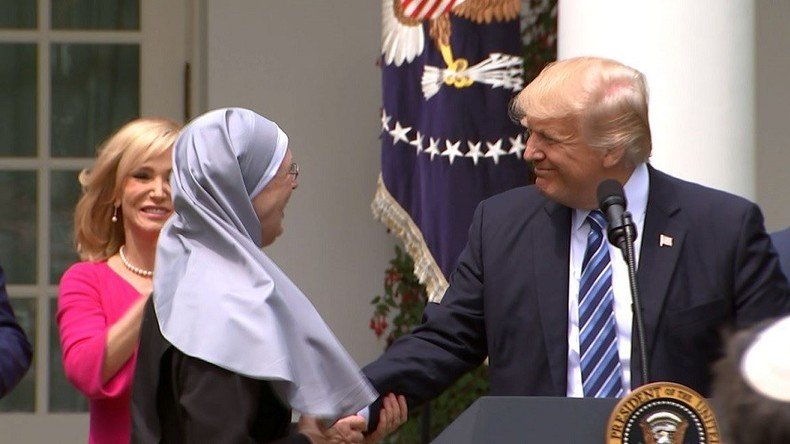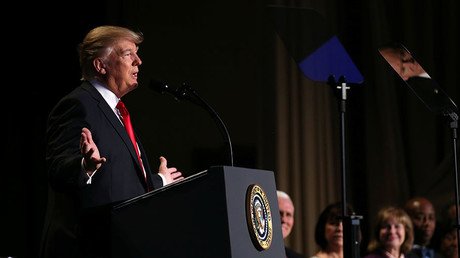Bully pulpit: Trump signs order allowing political speech in church, lawsuit threatened

President Donald Trump signed an executive order on the National Day of Prayer, seeking to circumvent a decades-old law prohibiting political speech in places of worship and build on contraception coverage exemptions. Civil rights groups promised to sue.
The executive order will “prevent the Johnson Amendment from interfering with your First Amendment rights” and “directs the IRS not to unfairly target churches and religious organizations for political speech. No one should be censoring sermons or targeting pastors,” Trump said to a standing ovation. It also directs the Department of Justice “to develop new rules to ensure these religious protections are afforded to all Americans.”
“Our founding fathers believed that religious liberty was so fundamental that they enshrined it in the very first amendment of our great and beloved Constitution,” Trump said. “Yet for too long, the federal government has used the power of the state as a weapon against people of faith, bullying and even punishing Americans for following their religious beliefs. That’s been happening.”
"Financial threat against faith community is over": #Trump on exec. order to overrule IRS rules on faith institutions engaged in politics pic.twitter.com/BfbyTX7eYy
— RT America (@RT_America) May 4, 2017
The Johnson Amendment ‒ which Trump called “very, very unfair” ‒ is a 1954 law that bars tax-exempt organizations such as religious groups, including churches, from engaging in open endorsement of or campaigning for political candidates, among other political activities. These organizations "may not attempt to influence legislation as a substantial part of its activities and it may not participate in any campaign activity for or against political candidates," according to the Internal Revenue Service, which enforces the law.
“No American should be forced to choose between the dictates of the federal government and the tenets of their faith,” Trump said.
It is not clear if the president is able to direct the IRS to ignore enforcement of the Johnson Act without a bill from Congress lifting the ban. There have been no instances in which a church has lost its tax-exempt status for dabbling in political activity, Vox pointed out in November, although Trump said Thursday that the IRS went after Reverend Martin Luther King Jr.
Vice President Mike Pence introduced Trump at the ceremony in the White House Rose Garden, calling the president “a believer” who has “an unshakeable faith in God and the American people.”
As governor of Indiana, Pence signed a religious freedom law that was widely denounced as discriminatory and offensive to LGBT individuals. It led to boycotts of the Hoosier State before lawmakers bowed to the intense public pressure and altered the legislation.
The federal government enacted a similar law, the Religious Freedom and Restoration Act, in the 1990s, Pence said at the time. That legislation was spurred by job discrimination against Native Americans over the consumption of peyote in religious ceremonies.
In early February, a leaked copy of a draft executive order included similar message, which critics said would allow for widespread discrimination based on objections to sexuality, premarital sex, abortion and other reproductive health care, and gender identity. That language was not included in Thursday’s executive order.
It does, however, provide “regulatory relief” for companies that object on religious grounds to providing employees with contraceptive coverage, as mandated under the Affordable Care Act, also known as Obamacare. The executive order builds on the exemptions provided by the Supreme Court’s ruling in the controversial 2014 Hobby Lobby case.
‘Conscientious objectors’: Supreme Court divided on nuns’ challenge to Affordable Care Acthttps://t.co/EPxeqXV15upic.twitter.com/uzF9RXqEUl
— RT America (@RT_America) March 24, 2016
The American Civil Liberties Union immediately vowed to sue over the executive order, which ACLU Executive Director Anthony D. Romero described as “a broadside to our country’s long-standing commitment to the separation of church and state.” He also accused the Trump administration and Republican leadership in Congress of “using religion to further divide the country and permit discrimination.”
“President Trump’s efforts to promote religious freedom are thinly-veiled efforts to unleash his conservative religious base into the political arena while also using religion to discriminate,” Romero said in a statement. “It’s a dual dose of pandering to a base and denying reproductive care. We will see Trump in court, again.”
@ACLU "I can't do that, it's against my religion," is religious freedom.
— Jack MacDonald (@BlackJackMac) May 4, 2017
"You can't do that, it's against my religion," is overreach.













